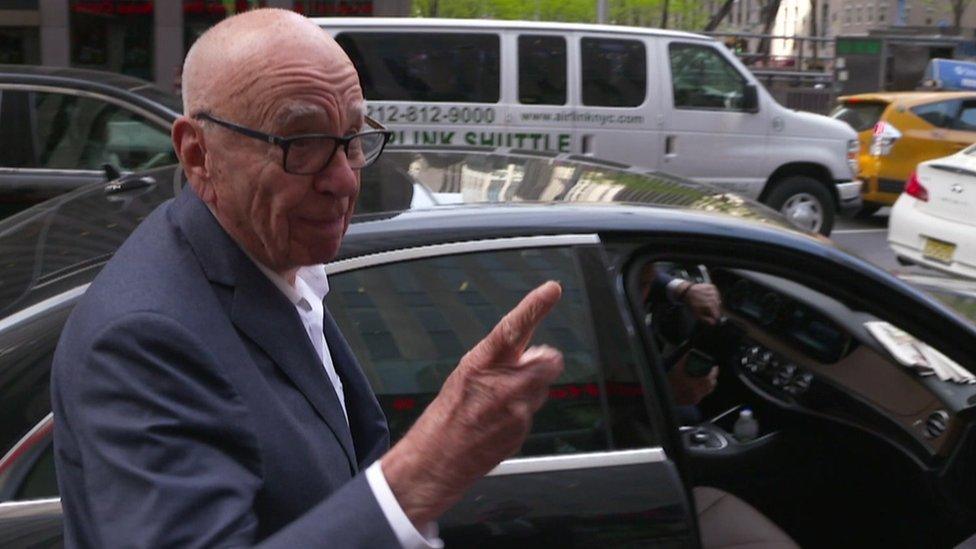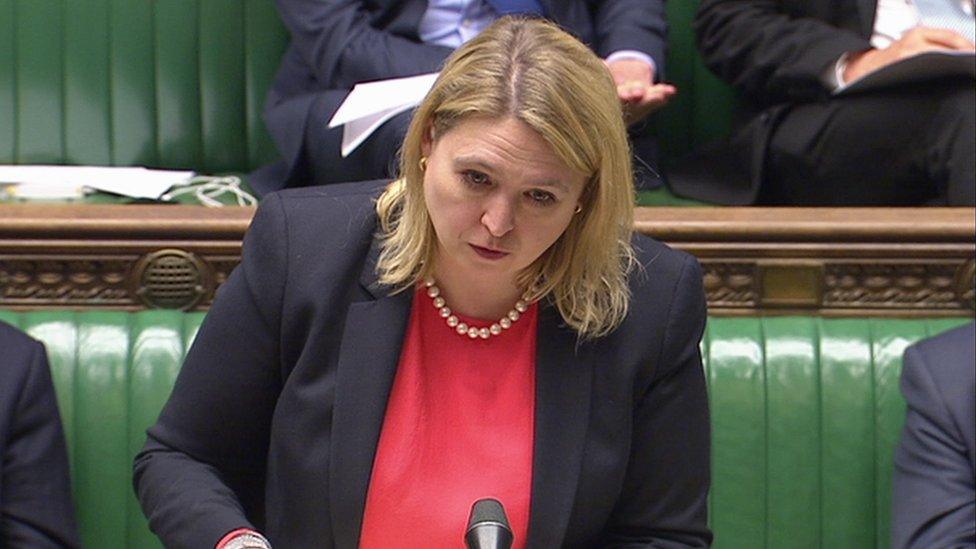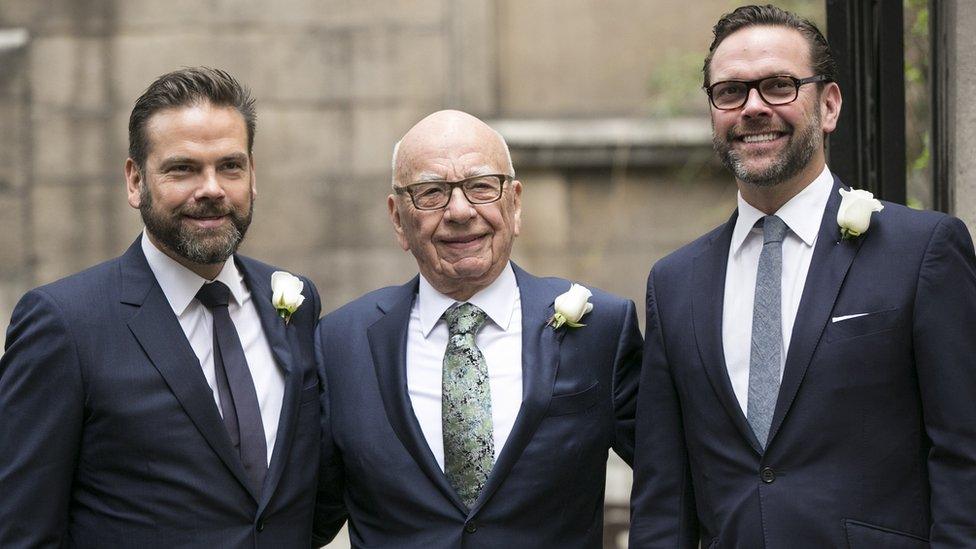Are the Murdochs too powerful?
- Published
When I said hello to Rupert Murdoch outside the Manhattan headquarters of his media empire last month, he told me he was "not worried at all" about Ofcom.
It turns out his confidence was misplaced, but not for reasons that are simple, or were widely predicted.
As Karen Bradley said in Parliament today, the advice she received from Ofcom was that despite massive corporate failure at Fox News, there was no good reason for doubting the commitment to excellent broadcasting standards of the future, fully Murdoch-owned Sky.
The regulator also said the Murdochs were indeed fit and proper holders of a broadcasting licence. The grounds, external on which Ofcom came to this view were that senior executives at Fox were unaware of the alleged rampant sexual and racial harassment by their biggest on-screen star (Bill O'Reilly) and Fox News' omnipotent late CEO, Roger Ailes, until 2016.
Given the alleged rampant harassment has been taking place since the early 2000s - though not a single case has yet been proven - this assertion by Ofcom opens up a very juicy possibility: if anyone can produce evidence that the Murdochs were informed about such behaviour before 2016, then Ofcom will have to review their thinking on the fit and proper tests.

Rupert Murdoch had said he was "not worried at all" about Ofcom
Journalists on both sides of the Atlantic have now begun searching for this evidence.
Douglas Wigdor, the lawyer who is leading the charge against Fox News in Manhattan, told me this afternoon: "In its bid to salvage the merger, Fox has represented to Ofcom that no executive director was aware of any allegations of sexual and racial harassment at Fox News prior to July 2016. I can assure you that the veracity of that statement will be probed in our current litigations."
Plurality concerns
Ofcom raised concerns about media plurality, saying that "public interest concerns" about excessive concentration of power justified moving to Phase 2 of this regulatory process.
But here we come to a curiosity about this case. Fox approached Ofcom to suggest behavioural remedies for these concerns. Basically they made suggestions about guaranteeing editorial independence and investment. These were enough to satisfy Ofcom, who said, according to Mrs Bradley, they were enough to "mitigate" the serious concerns about plurality - but that they could be strengthened.
If you study what Mrs Bradley said in parliament, she puts a great deal of weight behind Ofcom's view that these remedies suggested by Fox could be strengthened.
So for Ofcom, what Fox suggests on editorial independence and investment is enough to mitigate concerns about media plurality.
Whereas for Mrs Bradley, these proposals aren't enough.

Karen Bradley says she has been "scrupulously fair"
In short, Mrs Bradley defers to Ofcom on most of what they say, but on the crucial matter of media plurality, where they are satisfied but think more can be done, she finds reason to delay this process by many months.
The Competition and Markets Authority (CMA) will have at least 24 weeks to look into this matter - so long as there is no change to the government's position, following submissions to Mrs Bradley from the relevant parties by 14 July.
If the CMA come to the same conclusions as Ofcom about media plurality, the ball will be back in Mrs Bradley's court. So there could be a weird circularity about this whole process.
At every stage of this bid, the Secretary of State, who is acting in a quasi-judicial capacity, has taken the cautious path and deferred to other bodies. This has the effect of politicising - even though they would resist the term - Ofcom and its chief executive, Sharon White.
The name Murdoch is so synonymous with controversy that whatever Mrs Bradley's decision, and Ofcom's judgement, there would be anger.
A new media landscape
The truth is Rupert Murdoch and his newspapers aren't nearly as powerful in Britain as they used to be. Though their papers have an online presence, Westminster is often pathetically lethargic when it comes to political opinion online. And in any case, digital publications such as Mail Online will never, I suspect, have the influence of print ancestors such as the Daily Mail. This applies to the Murdoch titles too.
Moreover, the media world has changed beyond recognition in just a few years. Netflix will invest $6bn in content this year. Amazon are reinventing original production by the minute. I hear constant whispers that Facebook are going to follow Twitter into live sports.

Rupert Murdoch with his sons James (right) and Lachlan (left)
This massive disruption, rather than political influence, is driving James Murdoch's zeal for full ownership of Sky. It's about those who own the pipes and those who tell the stories becoming one and the same. It's the marriage of distribution and content, in the parlance, that I've been banging on about, external on this page.
When competition for eyeballs is so intense, he wants total control of the access to Sky's 22 million customers, particularly in the under-nourished markets of Germany and Italy.
A constant headache
The other story at Fox News which seems to have been neglected is that their ratings aren't what they used to be, and no wonder, given the departure of not just Mr O'Reilly but the brilliant Megyn Kelly.
Together with the flight of advertisers online, this ratings pressure threatens to reduce profits at Fox News - which means that the Murdochs need to sweat their other assets, such as Sky. Hence this bid.
A major worry for this still extraordinarily powerful family is that a new civil trial into phone hacking claims at The Sun is due to start in October. Fox had wanted to complete the takeover by the end of this year, to trigger a 10p-a-share special dividend.
That now looks unlikely. For the Murdochs, this second attempt to acquire full control of a broadcaster they have done so much to build is proving to be as big a headache as the first.
At some point, a politician will have to take a view on whether the Murdochs are too powerful. Given the current mood in Westminster, that's a tough call that Mrs Bradley - and the prime minister - feel they could do without.

Follow us on Facebook, external, on Twitter @BBCNewsEnts, external, or on Instagram at bbcnewsents, external. Follow my Twitter feed: @amolrajanBBC, external If you have a story suggestion email entertainment.news@bbc.co.uk, external.